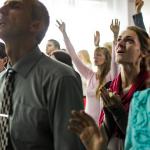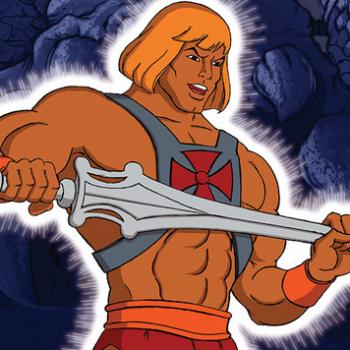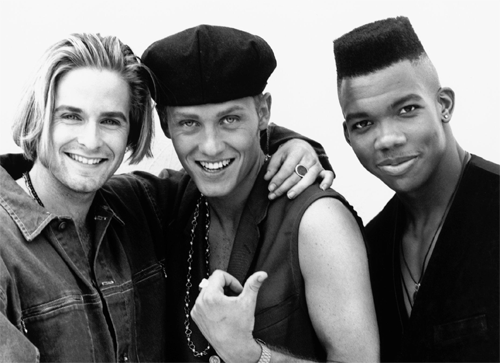
In my recent Sacred Cows post on dc Talk, I mentioned the “Jesus Freak” single that came out in August 1995. It was a big deal; it heralded a new sound for the band, one that many people who came of age in ‘90s youth group culture consider a touchpoint of Christian pop culture. I played the heck out of that thing until the full-length album arrived that fall.
Those who remember when singles were still released as physical media likely recall that they were rarely just the one song. There were B-sides or special tracks attached to justify the $5 or so you paid for the disc. On “Jesus Freak,” you got a remix of the title track, a live version of the band performing Larry Norman’s “I Wish We’d All Been Ready” and a live track of “Jesus is Just Alright.”
But there was something else, something that really excited me. The new-for-the-time “Enhanced CD-ROM” included a trailer for “Free at Last: The Movie,” a concert film/documentary that was expected to arrive in theaters in 1996. As my love for film was just beginning to turn into an obsession, I watched that trailer several times and obsessively checked the dc Talk website to see when it would be coming to my town.
It never did.
For a variety of reasons, the film was never released. The closest we got was the “Narrow is the Road” concert VHS, which ran about 45 minutes and contained some of the same footage. For years, we wondered why the movie never reached our screens. Were mainstream theaters shutting out Christian art? Was it too raw and honest to release?
In truth, it was something much more boring: contract disputes. “Free at Last: The Movie” was finally released as a special DVD with the anniversary release of the “Free at Last” album in 2002. By then, it was a fans-only affair for those nostalgic for Christian subculture, most of whom had grown out of dc Talk by then (to be fair, dc Talk had outgrown dc Talk by 2002). My brother picked it up and showed it to me. I thought it was interesting and then never thought about it again until this Sacred Cows piece.
I recently revisited the film and thought it might be worth talking about. To be fair, it’s not a lost cinematic treasure, nor is it the shocking truth about a Christian band’s struggles. But it’s worth a look as a time capsule about where Christian culture was in the mid-90s and an interesting missed opportunity to do something really revolutionary.
Product, not art
At one point late in the film, Toby McKeehan talks about his addiction to ambition, his desire to push himself and everyone around him to excellence, and how this thing that we often see as a positive character trait can also be an idol. “I need to remind myself that this is not about a product, but about people,” Toby says.
But make no mistake: “Free at Last: The Movie” is product first, character study second.
The 90-minute documentary is largely a concert movie with interstitial moments where the trio takes in sights around the country, wrestles with their newfound fame and talks about their spiritual struggles. The concert scenes make up the bulk of the film and, despite their rough cinematography, director Ken Carpenter captures the energy and showmanship that enabled the band to sell out arenas (I had a wistful twinge of nostalgia seeing a shot of The Palace of Auburn Hills and realizing I’d been at the show). Toby, Mike and Kevin jump, dive and shout and they’re surrounded by acrobatic backup dancers; when they need to slow things down, they have an acoustic set prepared.
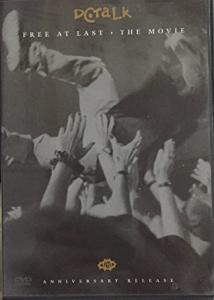
As a teenager, this amazed me. In the 90s, Christian artists could regularly pack arenas and my mom, who worked at Ticketmaster, secured us ground-level tickets to all the big (Christian) shows. No artists made us more excited than dc Talk, mainly because seeing them meant going to an honest-to-goodness rock concert. It was loud and energetic, with big dance numbers, flashing lights and crowds eager to toss up their hands and scream. It was the one moment where I felt able to experience rock and roll the same way that my non-Christian friends did, with the added benefit of it being “safe” (this is a topic for a whole other day). And I truly believed that while the band pumped us up, they also slowed things down for moments of true worship, where I experienced something transcendent and soul-enriching.
As an adult, I’m still amazed by the energy but I recognize how calculated it all is. There’s a crispness and polish to the show on par with any other act that’s filled these arenas. But two decades later, I’m not quite sure how I feel about all the lights, lasers and sound being used to create a spiritual experience. On the one hand, I don’t doubt the motivations of Toby, Mike or Kevin. I think they were talented young men who truly wanted to use their gifts to impact others, and this gave them a large platform on which to do that. On the other hand, using lights, lasers and sound to make us feel like we’re having a transcendent experience feels manipulative and crass. It’s a tension that I don’t know Christians have ever successfully navigated and why, as we get older, we often are more prone to have a spiritual experience listening to artists who don’t share our faith; we don’t have that worry of manipulation and commercialized spirituality. We don’t have to fear that our souls are being exploited, if that makes sense.
I hit that long digression because “Free at Last: The Movie” often feels as if it’s calculated to give a spiritual experience without requiring us to meditate or wrestle with uncomfortable truths. Toby and Michael lament that MTV wouldn’t play their video for “The Hardway,” which the film frames as a sort of persecution (it’s worth noting that MTV did play the video for “Jesus Freak”), but never delves into any larger context or talks with anyone from MTV. Michael visits with his brother who has been in and out of prison, but the film simply observes them watching a video and never delves into the conflict that must exist when you’re a Christian culture superstar with uncomfortable family dynamics. There’s a moment where Kevin Max and the team’s worship pastor get into an argument and use each other’s spiritual struggles as verbal ammunition, but the film quickly moves on.
I am sure that there is a compelling and complex movie to be made about holding onto your humility and faith in the midst of stardom. There’s obviously conflict to be mined from the tensions that occur when three creative individuals try to share the spotlight. But while “Free at Last: The Movie” wants to appear to have more on its mind, the truth is it’s just an advertisement for dc Talk. Which is fine from a marketing standpoint. It’s just that the attempts at depth feel shallow and manipulative.
Hints of depth
It might be silly to nitpick a 23-year-old film that never even saw the light of day. But the truth is, dc Talk had an opportunity not just to prove to the world that Christians could make music that sounded good and addressed deeper issues, but that could also deal with the deepest issues of our souls. For a faith focused on grace and redemption, there was the opportunity to showcase Christian culture’s biggest stars as flawed and in conflict. For the most part, however, the movie only pays lips service to those concerns, moving on before things get too fraught. But there are hints at a more challenging, insightful film that got left on the cutting room floor.
One figure in the film who gets a great deal of screen time is Michael Guido, the band’s road pastor. Guido’s presence promises to keep the bandmates in line as they encounter rising fame and screaming fans. But aside from the briefly aforementioned altercation with Kevin, Guido’s job seems to consist of doing quick devotionals before shows and being a sounding board for Toby, Mike and Kevin.
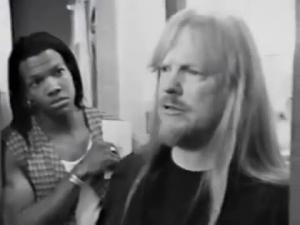
On the “Jesus Freak” song “What if I Stumble,” dc Talk dealt with the very real dilemma of being fallible human beings on a visible platform; the fear of screwing up and dragging their reputation — along with Christ’s — through the mud is palpable throughout that song. One imagines that, as the band was prepping for the album during this tour, those thoughts were on their mind throughout the “Free at Last” tour. And yet, the movie glosses over any of that inner turmoil. When Toby wrestles with his ambition, he’s already come to a place of recognizing his flaws and presumably moving on. Interpersonal disputes are alluded to but dismissed. There’s a suggestion that Kevin and Toby butt heads, but the cameras never capture any altercations.
It’s a shame, because more honesty on that end — even at the expense of one of the many concert scenes — would have lent resonance to moments like Brennan Manning leading the three in communion on Good Friday (Manning’s opening into to “What if I Stumble” is taken from this moment). Toby was already married at this point and his wife seems to hint that she’s aware of his tendency to push himself too hard; why not stop and explore that more? I’ve already mentioned how the film glosses over Michael Tait’s strained relationship with his brother, and the film also tosses off a Kevin’s questions about his own adoption. But the film is content to raise the questions and then move on to the next show-stopper.
I’m not sure why I’m so frustrated by this. After all, dc Talk is far from the first band to do a concert film that tossed in some interesting-but-shallow diversions. But I think it’s because, in my mind, I remembered the band as being more paradigm-shifting than they might have actually been. I remember them as a group that lent rawness and reality to Christian art; this film reveals how packaged and part of the machine it all was. It’s frustrating to see that the seeds were there to do something interesting and risky with a documentary about Christian artists, only to see the film settle for being a pale imitation of what we’ve seen countless other bands do. It might be more about me realizing my youthful naiveté, but there’s the feeling that dc Talk was poised to do something different here and, instead, just tossed off another marketing promo.
This was never going to last
I can’t imagine what it was like to be involved in a highly successful band at the age of 30, as the members of dc Talk were. They went straight from college into the industry and quickly became stars. They not only had to bear the burden of being acclaimed artists and entertainers, but — fair or not — spiritual role models, people modeling Christianity on a giant stage.
At 30, I don’t know that I would have been able to shoulder that burden. Heck, at 38 I still don’t know what right I have to be imparting any kind of spiritual wisdom to anyone. Remembering my college days and youth, I remember how headstrong and energetic I was about my faith, how focused I was on making a difference. And looking back at these three young men as they tried to navigate that, I felt for them. I don’t doubt that they wanted to go in and be genuine about their faith in front of thousands of fans; and the biggest legacy of dc Talk might be that they never really sacrificed that commitment. Faith still drives their work. That’s amazing, particularly in a world where many musicians professing faith deconstruct and decamp on a regular basis.
I don’t know the story behind “Free at Last: The Movie,” but I wouldn’t be surprised to learn that Carpenter and the trio wanted to make something raw and honest, only for producers to insist on something family friendly and safe. Maybe I’m wrong. But as the arena shows grow more packed and award shows grow more frequent, one gets the sense that the Christian industry was churning full force and not wanting to stop the momentum.
Artists chafe under that, and although the film only hints and strife among the three, hindsight allows you to see that dc Talk wasn’t going to make it long-term. Toby, Kevin and Max come across as individuals with their own drives, passions and interests, and it’s easy to see how those would cause them to diverge one day. As they begin laying down tracks for “Jesus Freak” near the end, Toby hopes the album will be something more cohesive (and it was). But you can see the seams starting to show. I don’t know that dc Talk disbanded because of strife; I don’t think that comes out through this. But you can see that this is a band composed of three unique individuals, and it’s telling that there’s more time where they are seen apart (when not onstage), each with their own storylines. Perhaps it was inevitable that just two albums later and less than a decade after their first release, dc Talk was pretty much done.
“Free at Last: The Movie” isn’t revelatory and is probably for completists to seek out only. But it’s worth a look for seeing the way that the Christian machine churns just like any other and seeing how our struggle to be authentic can be lost when combined with the struggle to make a profit.


